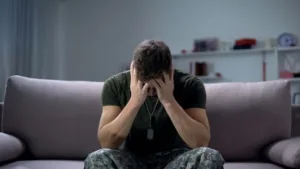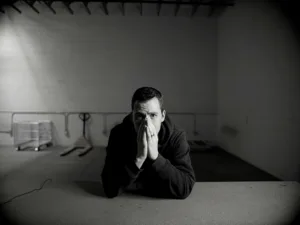At least one in six men has been a victim of sexual abuse of some sort, at some point in their lives.
Therefore, if you were sexually abused as a child, you are not alone.
This sounds incredible to many, even to the victims themselves. The reason why this statistic seems like it can’t be true is the fact that boys and men largely under-report sexual assaults or abuse. The reasons are mostly cultural and originate from a deeply-rooted taboo around sexual abuse of males. However, even though everyone avoids talking about it, the statistics say it happens much more frequently than expected.
The Facts and Stats
Sexual abuse is a rather wide notion, both clinically and legally. It includes many levels of abusive behavior. Sexual abuse ranges from “mere” exposing of a person to sexual content without their consent, to forceful penetration without the victim’s consent. The reason is simple – any form of sexually abusive behavior has the potential of causing serious, long-term consequences to the victim.
At Denver Men’s Therapy we speclize in treating young and adult men who were sexually abused as children.
This is also the reason why many instances of sexual abuse might go unrecognized even by the victim himself. Especially when victims are children or adolescents. When a boy or a young man is showed sexually explicit images or talked to in a sexually seductive way, there may be a lot of room for doubt whether what had just happened constitutes abuse. However, even in cases of forced penetration, due to reasons we’ll talk about more in the next section, many victims are left feeling uncertain whether they were the ones provoking the abuse, whether they are the ones to blame. Let’s say it right away – you’re not!
The victim is never responsible for what had happened to them, no matter what. No one ever asked for being abused.
Regardless of what the perpetrator (who is often someone close to the victim or the victim’s family) or others have to say about it.
As much as one in six men suffered some form of sexual abuse during their childhood or adulthood. And this may be an underestimate. According to a 2005 study conducted by the U.S. Centers for Disease Control, as much as 16% of men were abused by the age of 18.
Childhood sexual abuse can have negative effects long into adulthood. These include:
- Addiction
- Anger, Depression and Anxiety
- Difficulties in Romantic relationships
- PTSD
However, there were also studies that found that 18% of men were sexually abused before they turned 16. In essence, it is true that sexual abuse in general, but especially that of children and men, presents a problem that is largely under-reported, underestimated, and under-treated.
Why IS Sexual Abuse of Boys and Men So Under-Reported?
Another important thing to take into consideration is the fact that men are much less likely to report abuse than women, although sexual abuse of women is also a problem that is significantly under-reported.
A study that explored the recollection and interpretation of instances of sexual abuse that were substantiated in court (therefore, no doubt there was abuse), revealed that men and women differ significantly in how they view these events.
Sixty-four percent of women who had a documented history of abuse (documented by social services) actually considered themselves to be victims of such act. Startlingly, only 16% of men in the same situation see themselves as victims of abuse. This number testifies about the fact that for men, sexual abuse presents a taboo that seems to be very hard to overcome.
To present an accurate picture of the problem, it needs to be said that there is still a discussion on why men under-report sexual abuse to such extent.
The matter is gravely complex and shouldn’t be simplified without taking into account both individual psychological and general sociological factors.
However, to serve as a beginning of the discussion about this important issue, we’ll present two possible directions of thinking when it comes to reasons that men don’t report sexual abuse. They probably interact and form a seemingly impossible situation to get out of, if you were a victim of sexual abuse.
The two main reasons are both somewhat cultural in their origin. One interpretation, or one factor that may not be the only reason, is embarrassment. Men (and boys too) are meant to be strong, assertive, conquerors, not victims. This is the first thing that comes to one’s mind when they think of men, even in modern Western society. And for a man to be abused and to be put in the position of a helpless victim is a form of trauma after the trauma of abuse. They fear they would be ridiculed, put down, looked down upon, considered weak, etc. The prospect of such view on their person usually prevents men from speaking out.
The second possibility is the fact that men and boys tend to perceive certain acts that fall under the category of abuse in a different manner than women. For boys and men, more is permitted. Some sexually explicit acts are often a part of the rite of passage into adulthood. Therefore, many acts that are considered sexually abusive may not be seen as such by men. This adds to the social pressure not to raise the alarm when they happen.
What You Can Do If You Were Sexually Abused
The first thing to understand is that you are not responsible for the sexual abuse you experienced. In the United States, we have strict laws about sex with children. Childhood sexual abuse is illegal because children can never consent to sex. They are too young and they can not say “yes” to something they do not understand. To be clear you are not responsible for the abuse, the person who abused you is responsible.
It might be helpful and healing to tell someone if you have a parent, partner or trusted friend. Sometimes disclosing the abuse can take a lot of the painful weight off. Then is crucial is to address it with a trained professional. If you feel stuck and aren’t sure where to start, resources like HelpingSurvivors.org can walk you through first or next steps.
We have an expert team of therapists who all specialize in men and childhood sexual abuse and trauma. We are all trained in a highly effective form of therapy called EMDR. This therapy helps people get “unstuck” from their trauma.
Not every experience of sexual abuse is inevitably detrimental for a man’s mental health and well being. Yet, many can be, and they can affect your life in a number of ways, some of which might evade your conscious control. This is why you should seek a psychotherapist’s help at any point, regardless of how much time has passed since the abuse. The therapist will help you address any issues and questions that arise regarding the abuse and its consequences in a safe and accepting environment. If you’re ready, you can start any day. We’re here.






